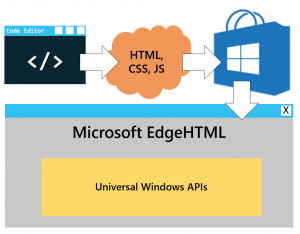| Project Westminster - Another Web App Format |
| Written by Mike James |
| Monday, 13 July 2015 |
|
Microsoft recently announced a plan to create "bridges" to allow programmers to covert their existing apps to WinRT apps. The first to be ready is codenamed "Westminster" and it converts websites to apps.
It all depends on how you look at what is going on with Westminster. It is a fairly simple idea and the implementation is essentially just a modification on the standard JavaScript Universal app. The publicity makes it sound as if what you are doing is somehow importing your web page and it gets converted into an app. This isn't quite what is going on. There isn't much in the way of conversion being applied. You web page simply runs in the "container" that all JavaScript apps run in under Windows 10 - or Windows 8 for that matter. What this means is that if you have an existing web page or web app then it will run on Windows 10 as a JavaScript app with the only difference being that the code, HTML, CSS and JavaScript, is served from your web site rather from the local storage. For security reasons you have to specify what URLs are permitted and this is stored in the app's manifest. Microsoft make a small fuss about the fact it makes use of the W3C standard for Web Apps - which is good - but not much about the rest of the approach is standard. If you want to stay with pure standards then your App will be Windows Store compatible, but it won't make use of any of the special features provided by Windows 10. If you want to make use of these you will have to add code to call the APIs. If you go down this road then don't expect any of the new features to work on any other platform and they won't even work if viewed in a browser under Windows 10. The additional APIs are provided via the Universal App wrapper. If you convert any old web page to a Universal App what you get is essentially the web page minus any of the unsupported technologies like Flash, ActiveX, Silverlight and so on running in Edge. So really project Westminster doesn't so much import and convert your web app to run under WinRT it simply creates a new type of web app - one that goes beyond the standards to make use of Windows 10 proprietary APIs. The only good news is that by including tests to make sure that the Windows APIs are available you can still allow the same code base to run in a web browser just as it did before you "converted" it. You can also mix remote and local content. In this sense the app behaves as it if is a standard JavaScript Universal app but with access to web content. It is difficult to know if this introduces any interesting security problems. See what you think about the following video:
My immediate reaction to "you can use your favourite code editor" was that Visual Studio is my favourite code editor, but it seems to be the only one I can't use unless I had used it to create the web app in the first place. There doesn't seem to be any remote download of the files, so you can edit them and keep them in sync on a remote server. You can submit your efforts to the Windows Store. Sideloading is also possible and Windows 10 might even make it easier with a simple "allow sideloading" setting. It is difficult to know if this is going to make enterprise distribution of apps easier, but my guess is that without security it won't. One very surprising feature is that once you upload your app to the Windows Store any changes that you make to its online content are immediately reflected in the web app. To be honest it is difficult to see how this could work any other way, but it does open up ways of getting content that might otherwise be rejected into the Windows Store - until someone complains or notices. Project Westminster isn't so much a bridge as an extension. You can now create or reuse web content in JavaScript-based Universal Apps. How useful this really is we will have to wait and see, but we now really do have another flavour of web app to contend with.
More InformationProject Westminster in a nutshell
Related ArticlesUpdate To Windows 10 SDKs On The Way Why Should We Write Universal Apps When Microsoft Drops Them - Skype To Go Desktop Only Android And iOS Apps For Windows 10 Windows 10 To Be Released On July 29
To be informed about new articles on I Programmer, install the I Programmer Toolbar, subscribe to the RSS feed, follow us on, Twitter, Facebook, Google+ or Linkedin, or sign up for our weekly newsletter.
Comments
or email your comment to: comments@i-programmer.info
|
| Last Updated ( Monday, 16 November 2015 ) |


